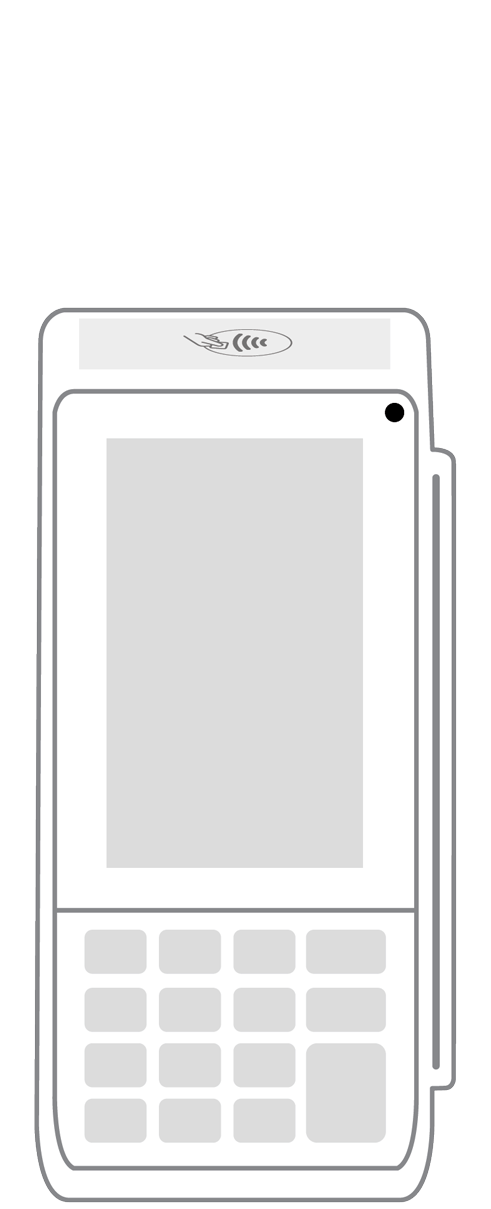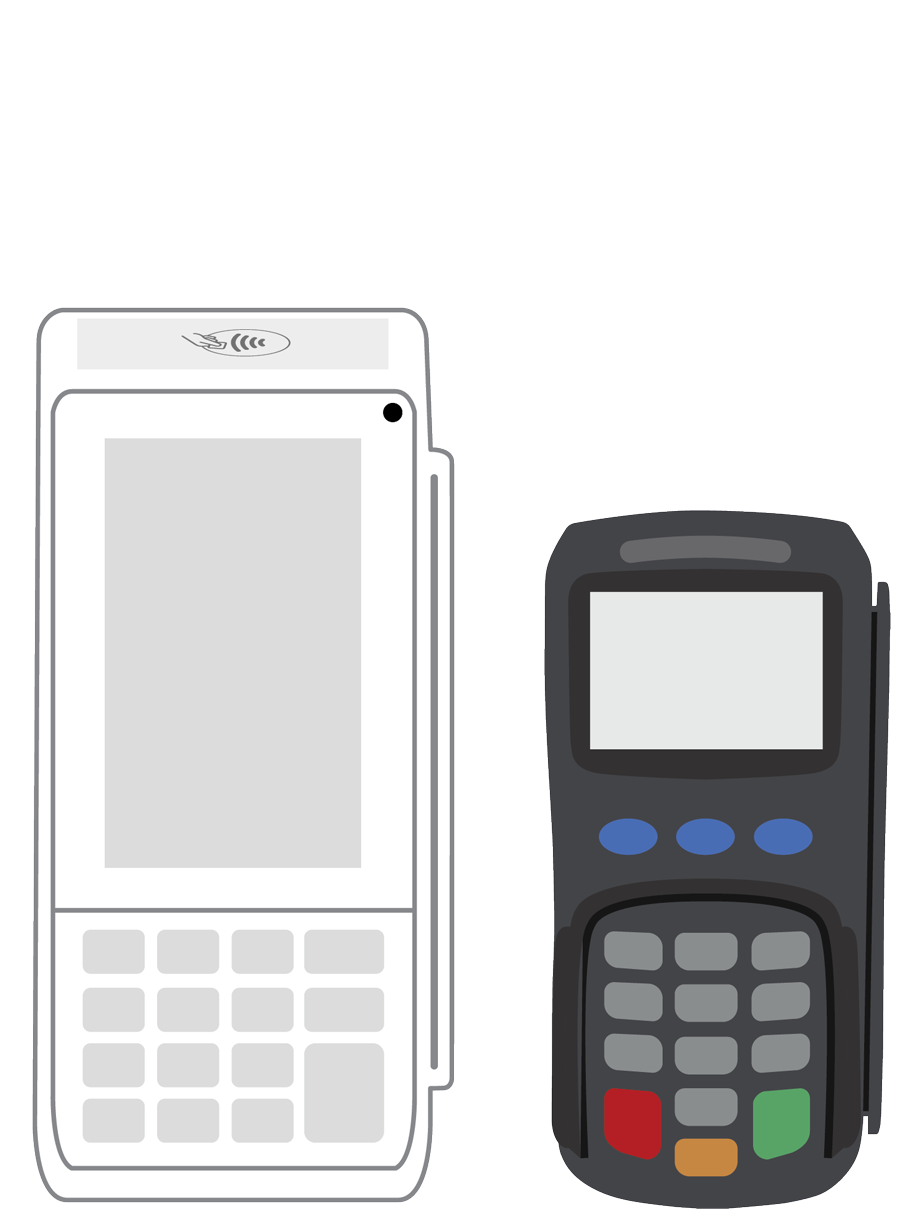How to future-proof and streamline your business with a smart terminal.

What is a smart terminal?
Not so long ago, stationary credit card terminals and the software that ran them were responsible for one job: Facilitating customers’ credit card payments. To do this, they employed a card reader, a wired credit card machine, and a communications program that interfaced with their payment processing partner.
Unlike their so-called “dumb” predecessors, today’s smart terminals come with numerous capabilities. It starts with the types of cards they can accept. In addition to the old-school and less-secure magstripe cards that were commonplace in the past, they can also accept modern EMV chip cards, providing an infinitely more secure experience for buyers and sellers alike.
Moreover, smart terminals align perfectly with today’s preference for tap-and-go or contactless payments. Using near-field communication (NFC) technology, they can exchange information with a customer’s compatible smartphone or wearable device, allowing for a fast and seamless payment experience.
While facilitating purchases is still one of their vital functions, smart terminals do so much more. Most notably, they contain a vast toolbox of capabilities that can help to streamline the running of your entire business. This includes your customer, employee, and inventory management, chargeback reduction, accounting, sales forecasting, and customized report generation.
Going far above and beyond simply accepting payments, smart terminals can function as the “eyes and ears” of a business. Thanks to their data analysis and financial management features, merchants can use them to reliably keep track of profits, losses, revenue, and sales trends. Best of all, they drastically cut down on instances of human error in the data entry process.
Smart terminal features.
One of the key elements that places smart terminals above their less-proficient ancestors is their ability to exchange information between hardware and software programs. This brings a vast array of added information into their orbit that enables merchants to record and consolidate data. Merchants can then generate reports ripe with valuable insights into sales trends, employee performance, and so much more.
Better still, the information that smart terminals gather can be transformed into clear, actionable reports that you can share with employees, investors, and even auditors. These analytics-based reports will help you to move your retail operations forward in the right direction to meet customer needs by offering the products they truly want.
Thanks to their easy integration with QuickBooks accounting, many of today’s smart terminals help to greatly simplify the stress and complexity of tax season. Gone are the days of frantically searching through drawers for receipts and poring over spreadsheets. With smart terminals, clear and accurate financial reports are always at your fingertips.
Protecting the privacy, confidentiality, and integrity of sensitive customer payment data needs to be a high priority for any business that stores, manages, or transmits this data. Today’s smart terminals use robust protection measures such as the latest in certified, point-to-point encryption and tokenization to help protect these payment details from identity thieves and other criminals.
How smart terminals help future proof and streamline your business.
Technology is constantly evolving. As a result, keeping up with the latest payment innovations can often be an expensive and overwhelming ongoing task. Thanks to smart terminals, however, much of the financial and labor costs are minimized because the software can be remotely and readily updated.
As smartphones become even more important than they already are, businesses who want to remain competitive will have little choice but to accept payments from these devices. Fortunately, smart terminals are already well-positioned to interface seamlessly with the digital wallets contained in buyers’ hand-held devices. The customer simply pre-loads their phone’s wallet with their payment information, which is then encrypted and securely stored for future use. Then, at the time of purchase, they open their digital wallet, place the device near your NFC reader, and authenticate their identity. Within just a few seconds, the payment information is securely communicated to the processing company, and the transaction is approved or declined.
Why businesses should care about smart terminals.
In today’s global marketplace, competition is more cutthroat than ever. Merchants wanting to rise above their rivals are finding that one of the best ways to excel is by creating a tailored customer experience that takes each buyer’s unique needs and characteristics into account. Smart terminals enhance sellers’ abilities to provide a holistic customer journey by collecting and storing valuable information that allows for targeted marketing campaigns.
Customers use their smartphones to gather information about products before making a purchase. Therefore, today’s phones function as both shopping and buying tools, with smart terminals acting as highly secure and efficient conduits.
When you consider the wide range of tasks that smart terminals can streamline, it’s no wonder that an increasing number of small to mid-sized business owners are incorporating them into their retail strategies. If you don’t want to fall behind, you should bring these high-powered tools on board as soon as possible.
 3-in-1 Reader |  Terminal |  Keypad |  PINPad Pro |  Flex |  POS+ | |
|---|---|---|---|---|---|---|
Payment types | ||||||
EMV chip card payments (dip) | ||||||
Contactless payments (tap) | ||||||
Magstripe payments (swipe) | ||||||
PIN debit + EBT | ||||||
Device features | ||||||
Built-in barcode scanner | ||||||
Built-in receipt printer | ||||||
Customer-facing second screen | ||||||
External pinpad | ||||||
Wireless use | ||||||
Network | ||||||
Ethernet connectivity | With dock | |||||
Wifi connectivity | ||||||
4G connectivity | ||||||
Pricing | ||||||
Free Placement | ||||||